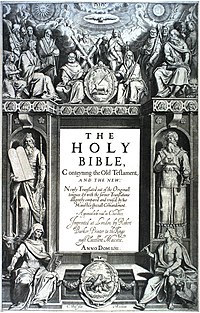I found myself rather amazed by the history of the Bible itself. From the original Latin Vulgate version to the final translation of the King James Bible, the history is full of drama, enough to probably create a long running series if one were made.
As I looked at all the different versions of the Bible, I thought of how the evolution of the pure look of the Bible was.
From:
To:
It really is quite impressive.
What I found the most interesting bit of history is the many attempts and the trouble of getting the Bible translated from Latin into English, which had become the more common language among the common people. I spent the most time looking at the Wycliffe and Tyndale bible.
From 1409 when the Archbishop outlawed the translation of the bible into English to 1538 when Henry VIII reversed that policy. For over 100 years, the majority of people were unable to read for themselves the Bible. The reason the legislation was even reversed was because it was "politically expedient" for the Church of England.
I found a fascinating site about how we got the English Bible itself: Click Me.
I read through the history, a lot of it overlapping with what was in the King James Exhibit. One part I'd like to point out is where the site mentions Thomas Linacre. He was a 1490's Oxford professor who decided to learn Greek. He read the Greek gospels and compared them with the Latin Vulgate version and said “Either this [the original Greek] is not the Gospel… or we are not Christians.” The Latin in the bible had become corrupt so much so that the message of the Gospel was no longer pure. The Catholic Church still threatened to punish anyone who read the Bible in any language other than English.
I wanted to also include this paragraph from the site as well:
"Having God's Word available to the public in the language of the common man, English, would have meant disaster to the church. No longer would they control access to the scriptures. If people were able to read the Bible in their own tongue, the church's income and power would crumble. They could not possibly continue to get away with selling indulgences (the forgiveness of sins) or selling the release of loved ones from a church-manufactured "Purgatory". People would begin to challenge the church's authority if the church were exposed as frauds and thieves. The contradictions between what God's Word said, and what the priests taught, would open the public's eyes and the truth would set them free from the grip of fear that the institutional church held. Salvation through faith, not works or donations, would be understood. The need for priests would vanish through the priesthood of all believers. The veneration of church-canonized Saints and Mary would be called into question. The availability of the scriptures in English was the biggest threat imaginable to the wicked church. Neither side would give up without a fight."
When King Henry VIII reversed the Church's policy of not allowing the printing of the English bible, it was an act of defiance since he wished to divorce his wife and the Church did not permit that. He created his own Church of England and further acted against the Church.
The King James Bible exhibit within the library was really an enjoyable experience. It was interesting to know how the scriptures by my bed came to be through centuries of translations and political influence.
Especially how long it took for the Bible to even be translated into English was especially fascinating.
If a language other than English ever became the dominant language, do you think it would take over 100 years again to allow for that?





That does sound interesting! (I particularly like the fact that your picture of the front page of the Bible is in French: 'La Sainte Bible')
ReplyDeleteFor a few weeks, I've been wondering, do you suppose people knew that there was such a pressure to keep the Bible from being translated? If I knew that someone was refusing to translate a book into my language, I would seriously wonder why it mattered to them so much that I didn't read it. Today, there is probably nothing that would guarantee that that book would be translated more surely than trying to restrict it. Do you suppose the common people didn't know what was happening, or were they just much more accepting than we are today, due to social reasons or something else?
I would think it was mainly due to tradition. After years of the Church telling you what is right and what is wrong, and more importantly being taught that the Church guides your entire life essentially, people probably just followed along because that is all they knew what to do.
ReplyDeleteBlind obedience.